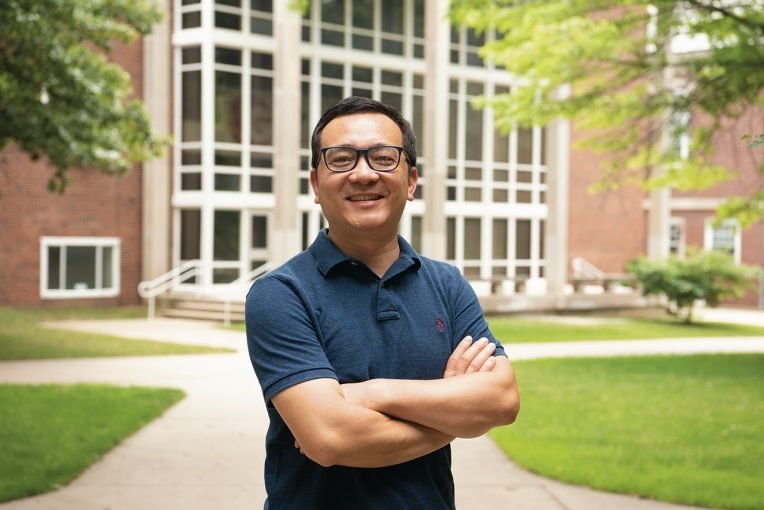Just last week, OpenAI CEO Sam Altman said that today’s students are the luckiest in history. Because AI is advancing more quickly than ever, he predicts that no one born today will outsmart it, and future generations will marvel at how students once struggled without these tools.
In 2025, college students can tap into more digital resources, guidance and support than any generation before them. The revolution is here—now it’s your move.
Whether you’re writing a report or preparing for a tough exam, AI tools can be a powerful starting point. They won’t replace deep research or give you ready-made quotes, but they can quickly provide a baseline understanding of your topic. For instance, chatbots like ChatGPT and Copilot are great for breaking down complex ideas, outlining key themes and pointing you toward the right angles to explore.
The challenge with research is usually too much information, not too little. But AI can help you sift through the noise and highlight what’s most relevant. Even the most basic tools can suggest structures for your essay, help you narrow your focus or recommend where to dig deeper. Just remember: You, not the bot, should lead your work. Think of AI as a guide, not a ghostwriter.
When it comes to finding credible sources, tools built specifically for students are even more useful. For example, platforms like Elicit and Research Rabbit help you search for peer-reviewed articles, discover new authors and map out connections between studies. Instead of wading through endless PDFs, you can use these tools to give you a clear path through the research jungle.
While no AI tool is perfect, Elicit in particular still manages to be about 90% accurate, which makes it one of the more trustworthy options out there.
Pro tip: Use chatbots for brainstorming and structuring, then switch to academic tools like Elicit for evidence and citations. That way, you can stay efficient without compromising quality.
Take smarter notes with AI-powered summarization
Sometimes, sitting through a lecture feels like running a mental marathon. Maybe your mind is elsewhere, maybe your stomach is growling or maybe the clock itself seems to crawl. But even if your focus slips, showing up still matters. Attendance is one thing, but more importantly, lecturers often drop insights and tips that don’t appear in the textbook—and those can make the difference between a good grade and a great one.
The problem? Lectures move quickly, and professors often wander off on tangents. It can be hard to keep up, let alone capture every detail. That’s where AI summarization tools come in. Instead of trying to scribble down everything word-for-word, you can use AI to record, transcribe and condense the key points so you can review them later.
If you struggle to keep up during fast-paced lectures, start with Otter.ai. It records and transcribes everything live, and it even highlights key themes so you can search and review them later (and yes, you can share them with your study group too). Or if your notes usually end up messy or half-finished, drop them into Notion AI. It’ll clean them up and break everything into clear sections—like “main points,” “examples” or even “possible test questions”—so revision feels less overwhelming. And if you’ve ever missed a lecture (no judgment), Perplexity can help you catch up fast. Just upload your transcript or class notes, and it will condense them into bullet points or explain the tricky bits you didn’t quite grasp.
These tools aren’t a shortcut. Instead, they’re a way to make your learning more efficient and your understanding deeper, all on your own schedule.
Pro tip: Use Otter.ai or Notta AI to record lectures live and generate a clean transcript so you can focus on listening in the moment.
Let AI be your editor, not your author
As tempting as it might be to let a chatbot spin up your essay for you, resist the urge. AI can’t (and shouldn’t) replace your thinking. But what it can do is act as a sharp-eyed editor.
These tools are great at cleaning up messy sentences, tightening your arguments and making sure your conclusions line up with your thesis. The heavy lifting—your ideas, analysis and voice—still has to come from you though. Think of AI as the friend who points out where you’ve gone off track, not the one who writes the whole thing for you.
The best way to use AI for editing is in layers. Start with tools like Grammarly or Quillbot, which go beyond spellcheck to flag awkward phrasing, tone issues and wordy sections that drag down your flow. Then, use Notion AI or ChatGPT to get feedback on your structure. To do this, copy and paste your essay and ask the bot questions like, “Where does my argument feel weak?” or “Does my conclusion connect back to my thesis?” These chatbots will then give you practical suggestions you can act on without losing ownership of the writing.
Here’s a clever trick many students don’t know about: Try asking AI to play professor. Copy and paste your draft and say, “Grade this like a tough lecturer and give me detailed feedback.” This way, you’ll get a sense of what might trip up your reader before you even hand in the assignment.
Even better, if you already have a marking rubric or an exemplar essay, feed that into the AI alongside your draft. AI tools are great at picking apart criteria and spotting the kind of language, structure and approach that examiners are looking for. The more context you give the tool, the more useful the feedback becomes.
Pro tip: Don’t shy away from being overly detailed in your prompts. The more context you give (like telling AI to focus only on your transitions or wordiness), the better the feedback will be and the more control you’ll keep over your work.
If you’re a student in 2025, the perks are better than ever. Almost every AI chatbot has a Pro tier or student deal, so you can simply choose the one you vibe with most and get started.
For example, Google is giving away its AI Pro Plan, normally worth hundreds, for free when you sign up with a college email. That means a full year of Gemini 2.5 Pro, Deep Research, NotebookLM and Veo 3, plus 2 TB of storage to handle all your notes and projects.
Perplexity is also making it ridiculously easy to get its Pro plan for free. Through its “Race to Infinity” challenge, if your school hits enough sign-ups with .edu or official university emails, every student there unlocks a full year of Perplexity Pro, no strings attached. You can check if your school is already in the race or start pushing it forward at perplexity.ai/backtoschool. Once you’re verified as a student (via SheerID), you’ll instantly get one free month of Pro, and every friend you refer adds on another free month.
If you add these offers up, you’ll have a suite of top-tier tools available for little to no cost, if you know where to look.
Pro tip: Don’t wait until exam season to claim these offers. Sign up early, stack the free trials and set reminders so you don’t miss renewal deadlines. That way, you can maximize every perk without paying a cent.
Elevate your studies through thoughtful AI use
This is a unique moment for your generation—you have access to tools that previous students could scarcely imagine. But AI isn’t just a new convenience. It’s also a skill that will shape how you learn, work and navigate the opportunities ahead.
If you use it to experiment, problem-solve and hone your thinking, and if you approach it as a tool that will refine your abilities rather than a shortcut to complete assignments, you’ll gain an advantage that endures far beyond the lecture hall.
Photo by Gorodenkoff/Shutterstock.com























